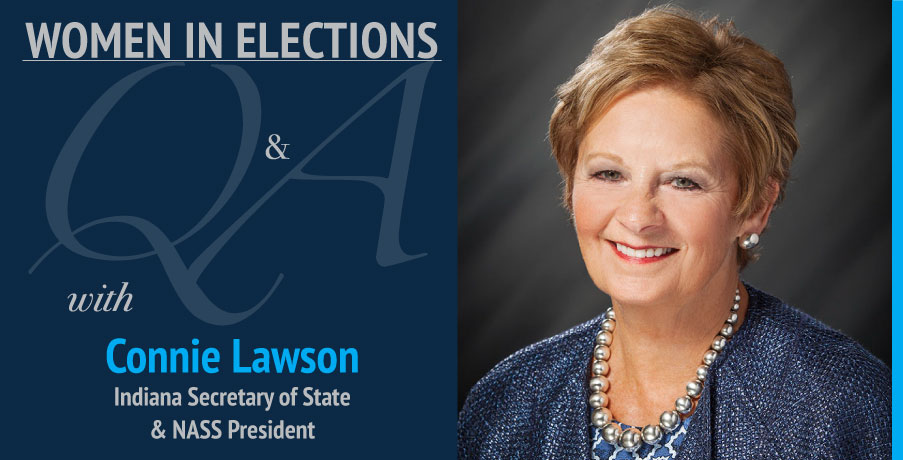
The EAC’s “Women in Elections” campaign has highlighted several women at the heart of elections at the federal, Secretary of State, state election director and county level. In honor of Women’s History Month, the EAC has shared the significant insight these women have to impart about the field of election administration at #WomeninElections on the EAC’s Facebook, Twitter and Instagram.
Today, we are concluding the series with a conversation between EAC Vice Chair Christy McCormick and Connie Lawson, Indiana Secretary of State and President of the National Association of Secretaries of State (NASS).
Christy, EAC: Thank you for joining me for this series, Secretary Lawson. I wanted to start by asking you how your career in elections began.
Secretary Lawson, NASS: My formal career in elections began when I was elected Clerk in Hendricks County, a position I served in for 8 years. I am grateful for having had the opportunity to serve Hendricks County as clerk and have continued to draw on the experience throughout my time in the legislature and as Secretary of State. Serving as clerk instilled in me a passion for elections and election administration and was an experience I am grateful to have had. It was a wonderful position that I would have gladly continued to serve in if it were not term limited.
Christy, EAC: You have no doubt seen many changes in election administration throughout your years as a clerk, an elected official, and as Indiana’s Secretary of State for the past 5-plus years. Would you elaborate on some of the advancements and challenges you’ve seen over that time?
Secretary Lawson, NASS: Since I was first elected clerk, elections and the way they are administered have vastly improved. I can still remember hand counting votes late into the evening (and often early into the morning) on Election Day. Also, before online voter registration, county clerks would be inundated with voter registration forms at the registration deadline. Precinct committeemen might bring in thousands of voter registrations at the very last minute, and it was very difficult to quickly process all of the forms!
The biggest advancements have been in election security and improving the ease of voting as well as voter registration. Advances in technology underlay many of these changes. Today, voters are able to check the status of their voter registration and even register to vote online in minutes. Elections have also become more secure through the implementation of electronic poll books and the passage of voter ID laws. Most recently, legislation was passed by the general assembly this year that will allocate funds to counties so that they can improve the physical security of voting equipment.
Christy, EAC: You have championed reforms to both modernize and increase the security of the voting process. One of your initiatives is the vote center model that allows voters to vote anywhere in their county. As a State Senator, you authored legislation allowing any county in the state to move to the vote center model and no-excuse early voting. Could you talk about the impact of that legislation?
Secretary Lawson, NASS: The implementation of vote centers has been a tremendous success with 37 counties having adopted the model to date. Counties can choose to adopt vote centers, which allows voters to vote at the polling location that is most convenient for them as opposed to their assigned precinct. Counties that adopt vote centers are also required to expand early voting opportunities. This allows voters to cast their ballots at a convenient time in the days before Election Day. County election administrators have done an excellent job in implementing these reforms and ensuring success of future elections. We hope that the flexibility afforded to voters residing in vote center counties will encourage voter registration and improve turnout.
Christy, EAC: For those who are not familiar with NASS’s mission, the association is the nation’s oldest nonpartisan professional organization for state officials – founded in 1904. In your view, what has NASS’s impact been on elections and the voters who NASS officials serve?
Secretary Lawson, NASS: NASS is a nonpartisan organization that allows secretaries of state and lieutenant governors to come together and exchange ideas. The result of this free flow of information is the development of sound public policy. Committees focus on pertinent topics such as voter participation, business services and elections. Member states bring to the table their experiences, both successes and failures, allowing all members to innovate and learn from one another.
Christy, EAC: Some members of NASS also make up the Election Infrastructure Subsector Government Coordinating Council (EIS-GCC) that will inform how the Department of Homeland Security (DHS) works with state and local jurisdictions to implement its designation of election systems as part of the nation’s critical infrastructure. What are a few of your thoughts on that effort and the most important goals that the GCC should address?
Secretary Lawson, NASS: Election security has been and will continue to be one the primary concerns of elections administrators for the foreseeable future. I believe that coordination between state officials and the federal government is necessary in order to maintain safe and secure elections. Fair and free elections are imbedded into the foundation of our nation and we must all work together in order to ensure the future of our democracy.
Christy, EAC: What would you say to a voter who is concerned about election security and integrity?
Secretary Lawson, NASS: Everyday my office and others like it throughout the nation work to make elections as secure and safe as possible. We seek to implement cutting edge technology in order to fight against those who seek to corrupt our system of government. We have made tremendous strides in improving election security in recent years and, rest assured, we will continue to do so.
We at the EAC would like to thank Secretary Lawson for her insight. This post concludes our conversations with “Women in Elections” throughout Women’s History Month.

